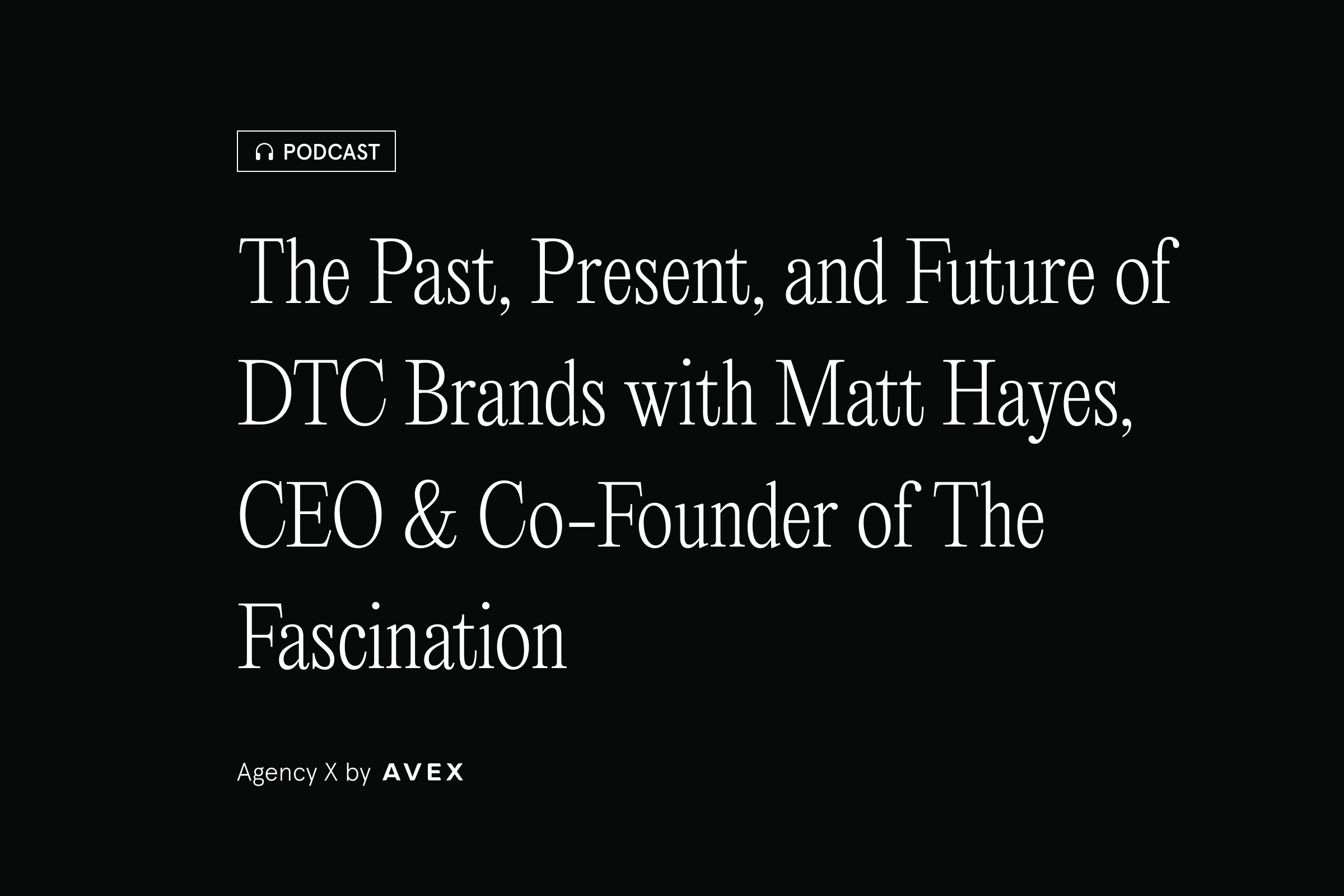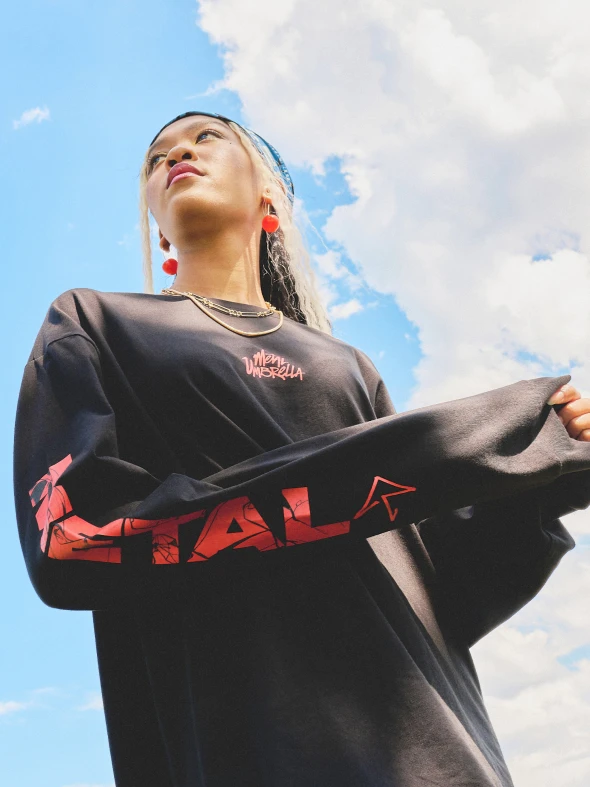Agency X Podcast: The Past, Present, and Future of DTC Brands with Matt Hayes, CEO & Co-Founder of The Fascination

Quick Summary Highlights from our podcast episode where John sits down with Matt Hayes to talk about his new online marketplace and all other things DTC.
In episode 28 of Agency X, Avex Founder and CEO John Surdakowski interviews Matt Hayes, Co-Founder and CEO of The Fascination, a DTC online marketplace. Before that, Matt was one of the founders of Leesa, a DTC mattress brand, which he helped scale to $125 million in third-year sales.
John and Matt spend the episode talking about how things have changed in the direct-to-consumer space, and which ways they see the industry going in the future.
Click here if you’d rather listen to the episode.
Introducing Matt Hayes
Matt 1:53 - 2:36 My name is Matt Hayes, I founded Leesa, a mattress company, back in 2014. I ran marketing and eCommerce there for several years, left the business around at the end of 2019, and partnered up with David Wolfe, who was the Leesa CEO.
We started doing things in the DTC space, and we set up our umbrella company called New Economy Brands. We started going down the path of ideas of what we are really going to do next and ended up launching a business called The Fascination which is sort of a multi-brand online marketplace that just went live at the end of 2019.
All About The Fascination
Summary of the Company
Matt 9:46 - 10:20 The Fascination, for those who haven't heard of it, is basically an online marketplace where you can go and discover new brands, read product reviews, and do the research on products, and then shop all in one place. So it's this one-stop-shop destination of our curated lens on the direct-to-consumer space across all categories. Whether you're in research mode or shopping mode, you can find content or commerce at the destination that will appeal to you.
The Problem it’s Solving
Matt 3:49 - 4:40 You've got cookware brands and brands disrupting the ramen industry—there's a little something for everyone there. But with all of that fragmentation and noise with these new entrants, it's gotten significantly harder as a consumer to say which brands do I like? Which products should I buy if there are 20 electric toothbrushes that all look and sound the same? Which one is actually the right one for me?
And so that consumer problem that we saw emerging, we saw it firsthand in mattresses and then more broadly just in the space as we watched it. That was one of the core theses around launching The Fascination when we did.
Matt 10:23 - 11:13 As I alluded to earlier, we started to see this wave and trend happening in the DTC space where there was so much hitting your Instagram feed every single day as you scroll through it. If you go to one site with some interest, all of a sudden, you get interest-based targeting from 10 others and now you've got this whole decision matrix to go through. That was happening across every single category (still is) but at The Fascination we, because of our fortunate position, wanted to bring a curated lens to consumers that might not have that ability. We get to see all of these brands and we get to try them in person. Some of them make the cut, some of them actually don't.
How Brands are Chosen
Matt 11:14 - 11:52 For every brand that goes on The Fascination, we look at two things: the science and the soul of the brand. The science is the evidentiary support, like the qualities, the features, and the benefits of the products themselves. The soul is the origin story, the mission, what they stand for as a brand. They've got to have both in spades.
We were just talking to Maggie on my team today, and she said something like 600 brands have applied since we launched. We just launched five months ago. There are only 150 listed on The Fascination. So the demand is really outstripping the supply.
Matt 14:22 - 14:56 All the products that we get, we actually send to a couple of people on our testing team. They test the products, put them through sort of the rigorous quality standards (depending on what it is) and they give their qualitative thoughts about it. Then that's completely separate from any sort of commercial business decisions that we make at The Fascination. The product review that ultimately hits the site is something that's objective. It's not influenced by any of our business team, and we like to keep it that way.
Matt’s Top Brands on The Fascination
Matt 6:19 - 7:28 I think Haus is a great brand. They've got a great brand story and Elena's a tremendous founder. I think stories are becoming huge for a lot of these younger, more recent founders. Their organic origin story which we tell on The fascination really shines through.
Brightland is another one. They make organic olive oil blends on their farm in California. A brand called CUTS that I wear and love all the time (clothing). Amazing menswear brand. Caraway is an amazing cookware brand. They literally went after pots and pans and they nailed it in terms of the product experience.
And then there are these trends of categories that are being disrupted. We just put a piece out maybe a week ago called Eat Like a Kid Again. And it's really nine brands that are going after your childhood favorites and basically reinventing things like pizza rolls and frosted flakes.
The Company’s Next Steps
Matt 19:44 - 20:24 We're gonna keep building out the team. We're running full speed right now and we got some gaps to fill. So we're gonna fill those and then the big focus is really building out our multi-brand online marketplace. That'll be the ability to buy multiple brands' products in a single cart in a single transaction. That's something that's happening in the background right now that we hope to have live this summer. Once we do that, it's really off to the races in terms of enhancements and functionality and all sorts of fun stuff we can do around acquisition.
See how we launch & scale brands on Shopify Plus with a data-backed approach
The Future of DTC
DTC to Retail
John 7:47 - 8:32 It's almost backwards where a lot of brands were starting with retail, growing there, and then looping in DTC commerce as a channel. I went to my supermarket and I saw Recess on the shelves, I saw Nuggs, the vegan chicken nuggets. And I'm also assuming Haus would eventually end up in bars and liquor stores too. Instead of going retail and then putting things online so people could also buy, it's completely shifted where now? DTC is great and they're doing well there. But they also now want to break into retail too, which is a huge shift that's happened over the past five years, and it just reversed itself.
Live Commerce
John 17:30 - 18:49 Live or social commerce is not just like pushing products on social channels, it's about how you can get a whole community involved. I think that's going to look really different. I agree that there's going to be a shift with the technology that supports it and how people are shopping because when it comes to influencers, I think influencer marketing is still really big and some brands definitely need it, but it's going to keep changing. We're going to see more true social commerce with people interacting a lot more.
There are going to be little updates here and there for like, checking out on Facebook or checking out on Instagram, which you kind of have already, but it's hard for brands to really build brand presence. Instagram is mostly just your imagery, but just trying to talk to the customer. So I think the websites are always going to kind of be there, but I think they’re going to be one other channel and then there's going to be multiple channels that people are going to be selling through as time goes on.
Design and Data
Matt 22:31 - 23:54 Design is really coming out to be the differentiator for a DTC brand. It permeates literally everything from the product to the experience to the first greeting when you hit the site, it just gives you the feeling that you want to buy or you want to engage with this product.
With Facebook evolving to how it's evolved and with iOS 14, I think the importance of having a creative workflow and like really testing your creatives and paid social, that's going to be super important. People think about it daily, we think about it all the time—how do we have a constant output of really great creative to test. That should be top of mind.
On the other side of the coin, if that's really humming, I think that on the product side, you really need to focus on squeezing efficiencies out of things like average order, value, cross-sells, testing prices, testing post-purchase, as much efficiency as you can gain there will give you that much more leeway to go out and acquire customers profitably.
John 25:11 - 26:20 A lot of people buy products because they want to kind of be included in that lifestyle, it matches their lifestyle and aligns with other brands that they like, and that's all design. That's content copywriting. So I've been stressing out for a long time. To me, design and focusing on data are extremely important.
One thing that we've been talking a lot more about, and really pushing is like making more decisions that are backed by data, thinking about average order value, and using tools like Nosto or Dynamic Yield to personalize experiences to gather as much info as possible so that you can AB test the heck out of everything, whether it's product rec, whether it's different call to actions or different content and personalizing the experience in email.
And of course, this needs to bleed into marketing too. That has to happen for marketing, I'm just really not interested in it because it's super expensive. But you're 100% right, it’s not 2000 anymore, you can't just dump tons of ad dollars into something and treat it like a dropshipping business. There has to be a story there.



